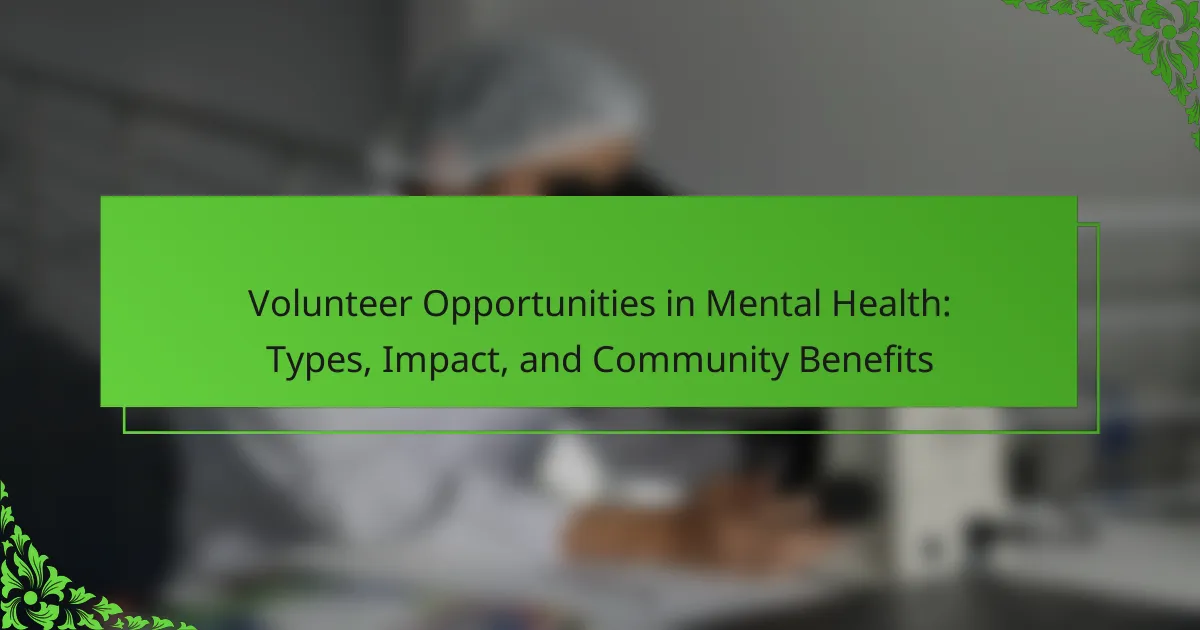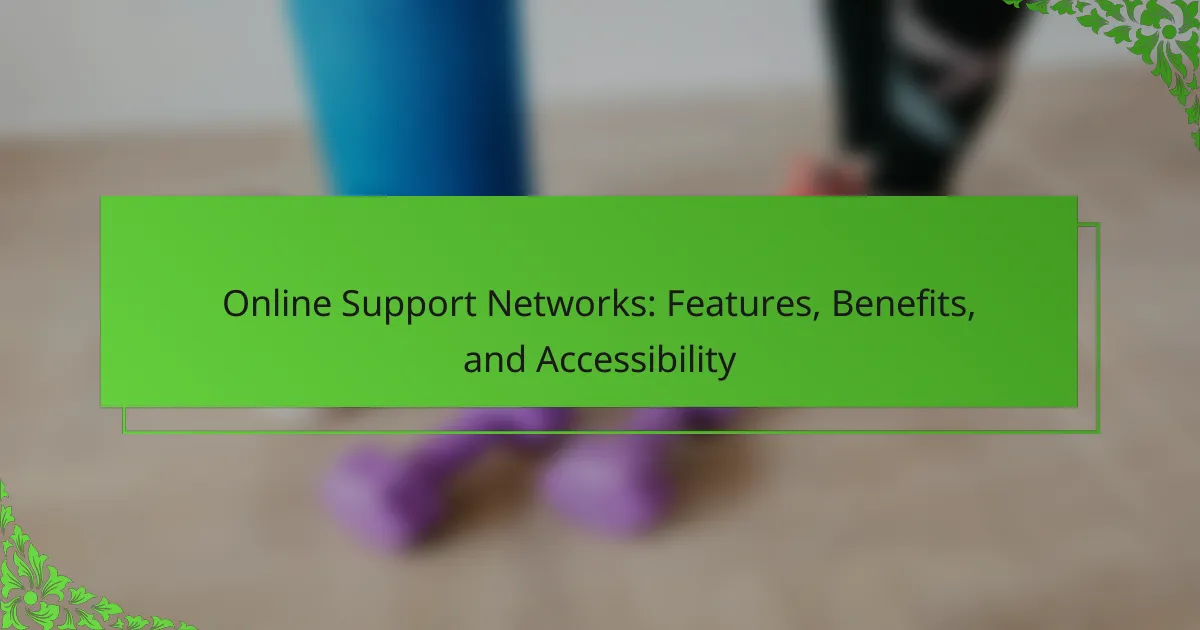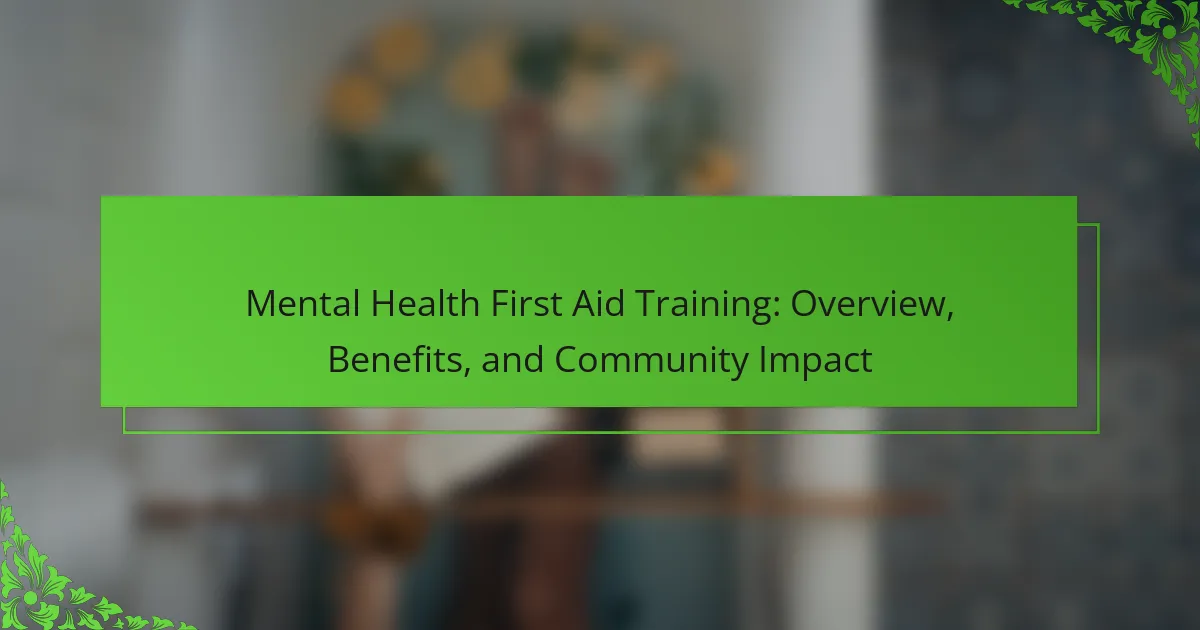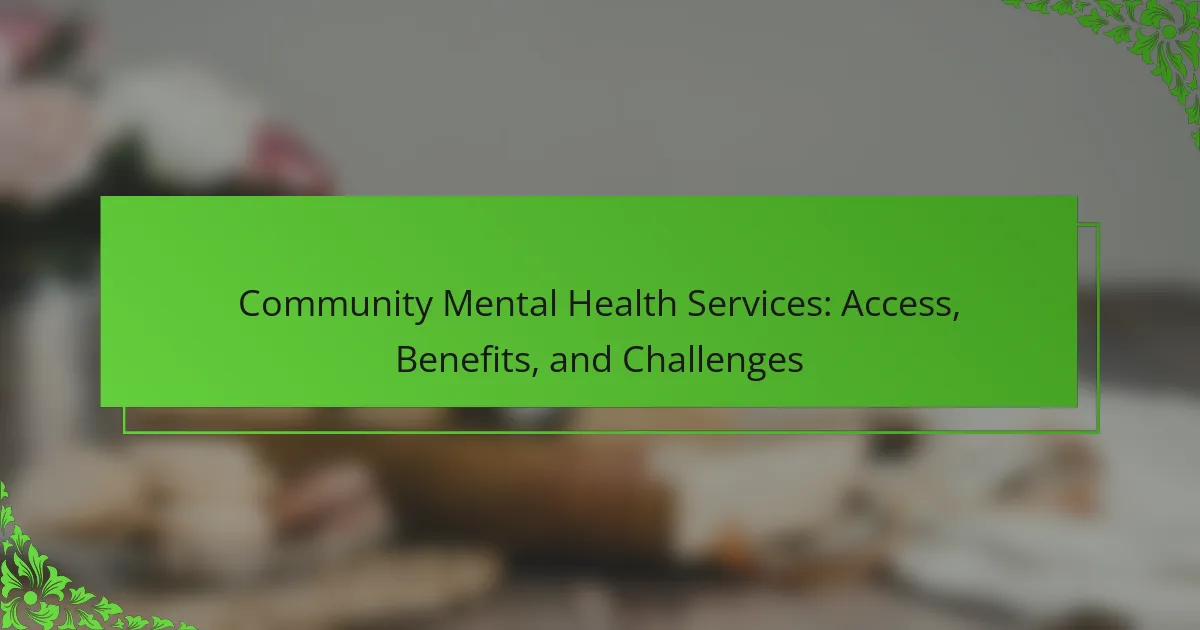Volunteering in mental health offers individuals a chance to make a significant impact while enhancing their personal growth. Explore various types of volunteer roles, including peer support and crisis intervention. Understand the community benefits, such as reduced stigma and improved access to resources. Recognize the challenges volunteers face and the skills they gain through their experiences.
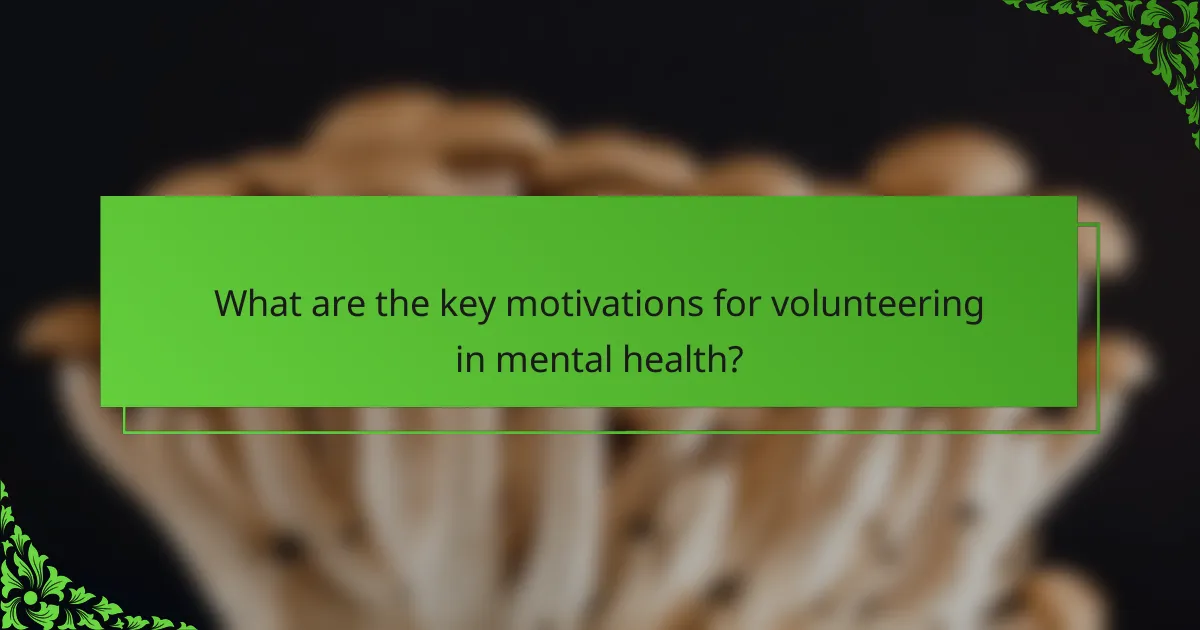
What are the key motivations for volunteering in mental health?
Key motivations for volunteering in mental health include a desire to help others, personal growth, and community engagement. Volunteers often seek to make a difference in individuals’ lives while gaining valuable skills and experiences. Many are driven by empathy and the need to support mental health awareness. Additionally, volunteering can provide a sense of purpose and fulfillment, enhancing overall well-being. Studies show that volunteers report increased happiness and social connections, reinforcing the positive impact of their contributions.
How does personal experience influence volunteer choices?
Personal experience significantly shapes volunteer choices in mental health. Individuals often select opportunities that resonate with their own experiences or those of loved ones. This connection fosters a deeper commitment and understanding of the issues at hand. For example, someone who has faced mental health challenges may feel compelled to support others in similar situations. Additionally, personal experiences can enhance empathy, making volunteers more effective in their roles. Ultimately, this alignment between personal history and volunteer work leads to greater community impact and benefits.
What skills do volunteers bring to mental health organizations?
Volunteers bring diverse skills to mental health organizations, enhancing support and outreach. They often possess communication skills, empathy, and organizational abilities. Many have backgrounds in psychology, social work, or counseling, adding valuable expertise. Additionally, volunteers may offer unique skills like art therapy, crisis intervention, or community engagement, which can significantly impact mental health initiatives. Their contributions foster a supportive environment, benefiting both clients and organizations.
Which demographics are most likely to engage in mental health volunteering?
Individuals aged 18-34 are most likely to engage in mental health volunteering. This demographic often seeks meaningful experiences and community engagement. Additionally, those with prior mental health experience or education show higher participation rates. Factors such as social awareness and a desire to support mental health initiatives drive this engagement.
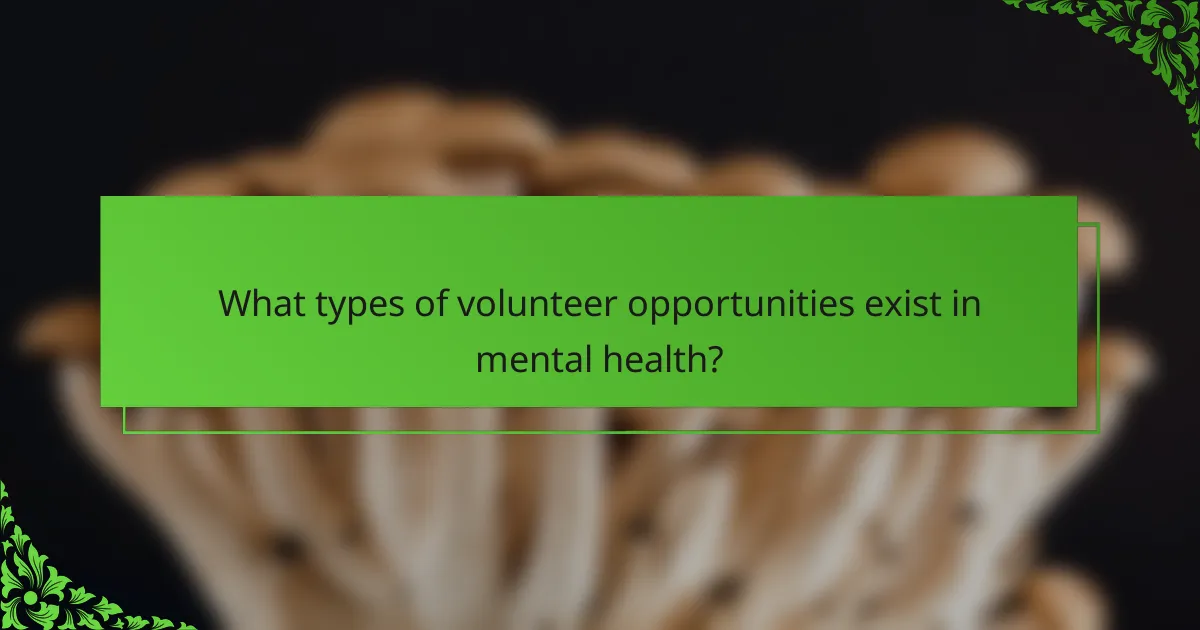
What types of volunteer opportunities exist in mental health?
Various volunteer opportunities in mental health include peer support, crisis intervention, advocacy, and educational outreach. These roles enhance community well-being and provide essential support to individuals facing mental health challenges.
Peer support programs connect trained volunteers with those experiencing mental health issues, fostering shared experiences and understanding. Crisis intervention volunteers assist in urgent situations, providing immediate support and resources. Advocacy roles focus on raising awareness and promoting mental health policies, while educational outreach involves teaching communities about mental health awareness and resources.
Engaging in these volunteer opportunities not only helps individuals in need but also enriches the volunteers’ understanding of mental health issues and strengthens community bonds.
How can individuals participate in peer support programs?
Individuals can participate in peer support programs by volunteering their time and skills. They can engage in various roles, such as facilitators, listeners, or mentors, depending on their expertise. Many organizations offer training to equip volunteers with necessary skills. Joining local mental health organizations or online platforms can provide opportunities to connect with existing programs. Participating enhances community well-being and fosters a supportive environment for those facing mental health challenges.
What roles do volunteers play in mental health awareness campaigns?
Volunteers play crucial roles in mental health awareness campaigns by educating communities, reducing stigma, and providing support. They engage in outreach activities, organize events, and facilitate workshops to promote mental well-being. Volunteers also gather feedback to improve programs and foster connections among individuals facing mental health challenges. Their involvement enhances community resilience and creates a supportive environment.
Which organizations offer structured volunteer programs in mental health?
Organizations offering structured volunteer programs in mental health include the National Alliance on Mental Illness (NAMI), Mental Health America (MHA), and the American Red Cross. These organizations provide various opportunities for individuals to engage in mental health advocacy, support, and education.
NAMI offers peer support programs that connect volunteers with individuals facing mental health challenges. MHA focuses on community education and outreach, encouraging volunteers to participate in awareness campaigns. The American Red Cross provides mental health support during emergencies, utilizing trained volunteers to assist those in crisis.
These programs not only benefit volunteers through skill development but also enhance community awareness and support for mental health issues.
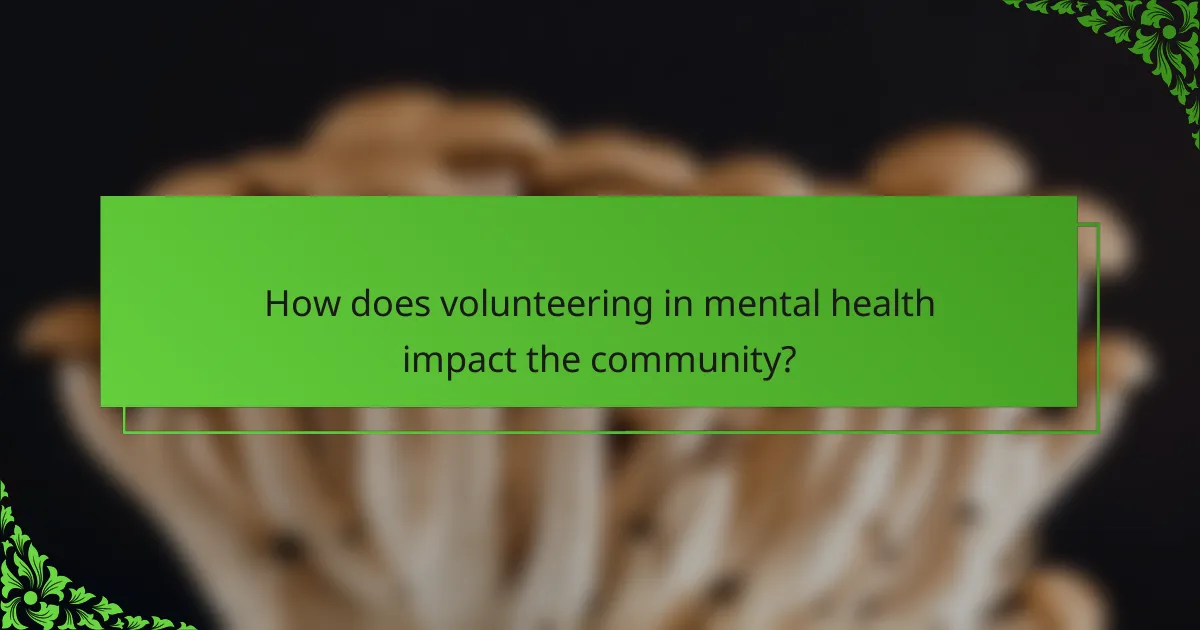
How does volunteering in mental health impact the community?
Volunteering in mental health significantly enhances community well-being. It fosters social connections, reduces stigma, and provides essential support to individuals facing mental health challenges. Volunteers help create awareness and promote access to mental health resources, ultimately leading to a healthier, more informed community. Engaging in these opportunities can also empower volunteers, enhancing their skills and personal growth.
What are the measurable benefits of mental health volunteering for communities?
Mental health volunteering offers measurable benefits to communities, including improved social cohesion, enhanced emotional well-being, and increased access to mental health resources. Volunteers foster connections, reducing stigma around mental health issues. As a result, communities experience stronger support networks and better overall mental health outcomes. Studies show that areas with active mental health volunteering programs report a 25% increase in community engagement and a 30% reduction in reported mental health crises.
How do volunteers contribute to reducing stigma around mental health?
Volunteers significantly reduce stigma around mental health by fostering open dialogue and promoting understanding. They engage directly with communities, providing support and education that challenge misconceptions. Through outreach programs, volunteers create safe spaces for discussing mental health, helping to normalize these conversations. Their personal stories and experiences can resonate deeply, inspiring others to seek help and support.
What community resources are enhanced through volunteer efforts?
Volunteer efforts enhance community resources such as mental health services, support networks, and educational programs. Volunteers contribute by providing emotional support, facilitating workshops, and organizing awareness campaigns. These activities lead to improved mental health outcomes, increased community engagement, and greater access to resources for those in need. As a result, communities become more resilient and better equipped to address mental health challenges.
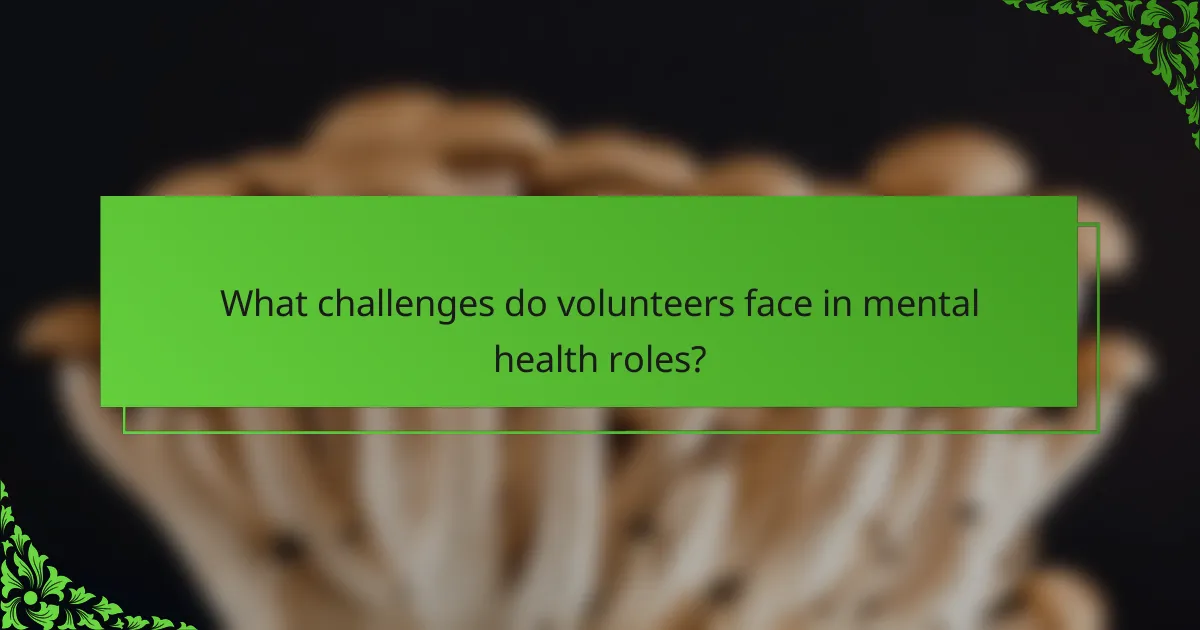
What challenges do volunteers face in mental health roles?
Volunteers in mental health roles face challenges such as emotional strain, lack of training, and high expectations. These factors can lead to burnout and hinder effective support for individuals in need. Emotional resilience is crucial, as volunteers often encounter distressing situations. Additionally, inadequate training can limit their ability to respond appropriately to complex mental health issues. High expectations from both clients and organizations can further exacerbate stress levels, making it essential for volunteers to seek support and resources to navigate these challenges effectively.
How can volunteers manage emotional strain while supporting others?
Volunteers can manage emotional strain by establishing boundaries, practicing self-care, and seeking support. These strategies help maintain mental well-being while providing assistance.
Setting clear boundaries protects personal time and emotional energy. Engaging in self-care activities, such as exercise or hobbies, replenishes mental resources. Additionally, connecting with fellow volunteers or mental health professionals offers valuable emotional support. These practices enhance resilience and ensure volunteers can continue their impactful work in the community.
What training or support systems are available for mental health volunteers?
Mental health volunteers can access various training and support systems to enhance their skills. Many organizations offer workshops, online courses, and mentorship programs, ensuring volunteers are well-prepared. Additionally, support groups provide a platform for sharing experiences and challenges, fostering community and resilience among volunteers.
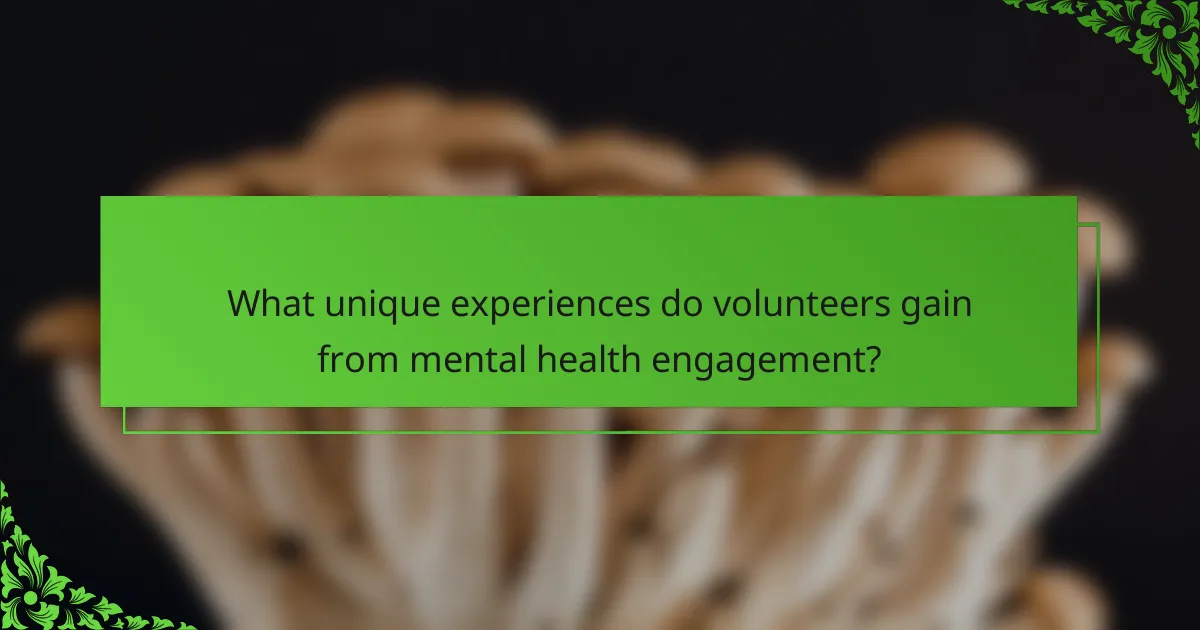
What unique experiences do volunteers gain from mental health engagement?
Volunteers in mental health gain unique experiences such as enhanced empathy, improved communication skills, and a deeper understanding of mental health issues. These experiences foster personal growth and community connection. Engaging with diverse populations allows volunteers to witness the impact of mental health support firsthand, enriching their perspectives and promoting advocacy.
How does volunteering enhance personal development and career prospects?
Volunteering significantly enhances personal development and career prospects by providing hands-on experience and skill-building opportunities. Engaging in mental health volunteer roles fosters empathy, communication, and problem-solving skills, which are crucial in various professional fields.
Volunteers in mental health often gain unique insights into psychological challenges, enhancing their emotional intelligence. This experience can differentiate candidates in job applications, as employers value practical experience alongside academic qualifications.
Additionally, volunteering builds a professional network within the mental health community, opening doors to mentorship and job opportunities. The impact on community well-being also reflects positively on volunteers, as they contribute to societal health and resilience.
Overall, volunteering in mental health not only aids personal growth but also strengthens career trajectories by cultivating valuable skills and connections.
Which rare opportunities exist for specialized volunteer involvement?
Specialized volunteer opportunities in mental health include peer support roles, crisis hotline staffing, and mental health advocacy. These roles allow volunteers to contribute unique skills and experiences, often providing direct support to individuals in need. Rare opportunities may involve specialized training in trauma-informed care or working with specific populations, such as veterans or youth. Engaging in these roles can lead to significant community impact, enhancing mental health resources and awareness.
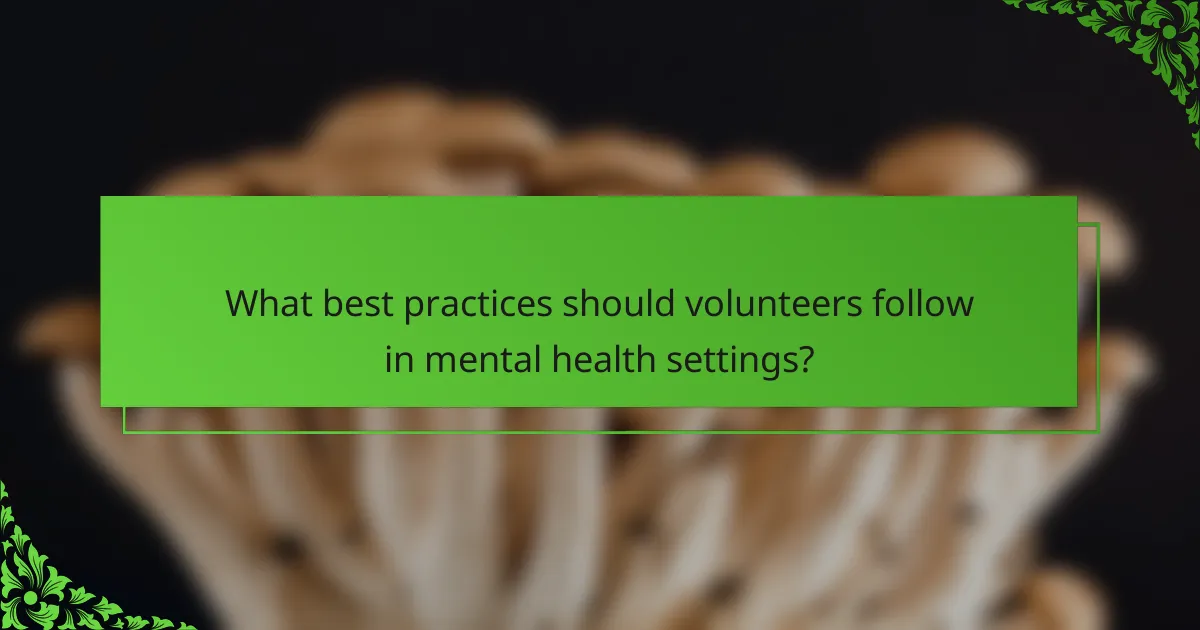
What best practices should volunteers follow in mental health settings?
Volunteers in mental health settings should prioritize empathy, confidentiality, and active listening. They must also undergo training and adhere to ethical guidelines. Engaging with professionals enhances their effectiveness in supporting individuals. Regular self-care practices are essential to maintain their well-being.
How can volunteers effectively communicate with individuals in distress?
Volunteers can effectively communicate with individuals in distress by employing active listening, empathy, and clear language. Active listening involves fully concentrating on the speaker, acknowledging their feelings, and responding appropriately. Empathy helps volunteers connect on an emotional level, validating the individual’s experiences. Using clear, simple language ensures that messages are understood, reducing confusion and anxiety. Additionally, maintaining a calm and supportive demeanor can foster trust and encourage open dialogue.
What strategies ensure a positive impact on both volunteers and recipients?
Engaging volunteers and recipients positively requires structured strategies. Clear communication fosters mutual understanding. Training enhances volunteer skills, ensuring effective support for recipients. Regular feedback loops maintain engagement and improve services. Celebrating achievements strengthens community bonds and motivates continued participation.
What common mistakes should volunteers avoid in mental health roles?
Volunteers in mental health roles should avoid common mistakes to ensure effective support. Key mistakes include lack of training, inadequate boundaries, and insufficient self-care.
1. Lack of training: Engaging without proper knowledge can lead to harm.
2. Inadequate boundaries: Failing to maintain professional limits can create dependency.
3. Insufficient self-care: Neglecting personal well-being can lead to burnout.
4. Ignoring confidentiality: Breaching trust can harm relationships and reputations.
5. Misunderstanding roles: Confusing volunteer duties with professional responsibilities can lead to ethical issues.
